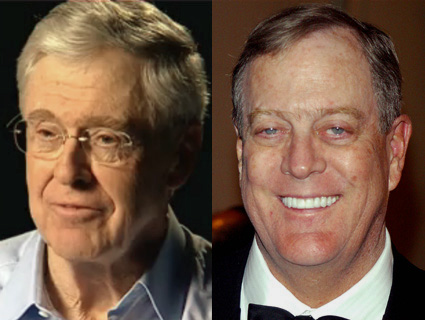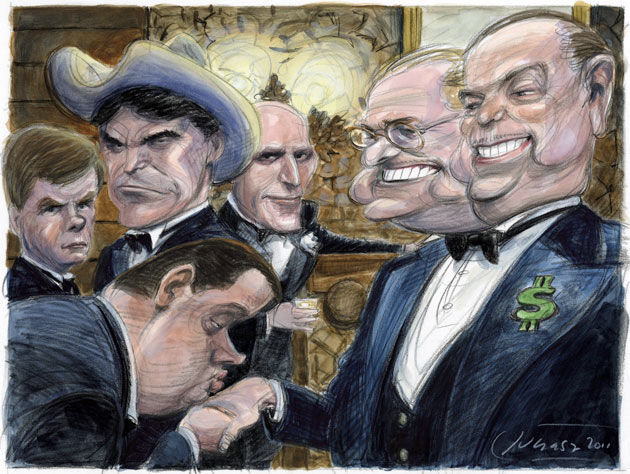
Charles (left) and David Koch.<a href="http://www.youtube.com/watch?v=VhCDK1OCRlc">kochmbmproductions</a>/YouTube; Globe Photos/ZUMA
Not long after the November elections, I met with Charles Spies, a big-time Republican fundraiser who’d run the pro-Mitt Romney super-PAC Restore Our Future, to hear his take on why Romney lost. We sat across from each other at a long wooden table in a tenth-floor conference room overlooking Pennsylvania Avenue. (Before his firm moved in, Spies says the conference room used to be Al Gore’s office.) We talked about super-PACs and the hundreds of millions they spent, the clout (or not) of wealthy donors and how they could get the most bang for their buck in a political campaign. Then, unprompted, Spies told me, “If I had the resources and wanted to impact the policy debate, I’d buy a newspaper or a magazine.”
“Even in today’s media climate?” I asked.
“Oh, absolutely.” He explained:
Not to make money. They’re not profitable. But imagine if I was, you know, a mogul that had 30, 40 million dollars to spend and cared about policy issues and elections. I’d buy the New York Times or the LA Times. Buy a major newspaper and put my people in on the editorial page and use that to frame issues the way I wanted to. And then I could claim that the news folks were separate from the editorial page but I think they know where the owner’s heart is at.
Spies is not a friend of Charles and David Koch, the billionaire libertarians. He does not move in their political circles. But in our conversation, he laid out what may be the best reason why the Kochs and their company are reportedly considering a move to become America’s newest newspaper barons.
As the New York Times reported on Sunday, Koch Industries, the massive conglomerate run by Charles Koch, is mulling a bid to buy eight prominent newspapers owned by the Tribune Company, including the Los Angeles Times, Chicago Tribune, Baltimore Sun, and Orlando Sentinel. Those newspapers are valued at $623 million, which is a pittance compared to Koch Industries’ annual revenues of $115 billion. If the Kochs wanted to do what Spies described, the megaphone that those newspapers would provide them is nothing to scoff at. The LA Times is the nation’s fourth-largest paper, the Tribune the ninth-largest, and tens of millions of people combined visit the newspapers’ websites each month.
A bigger platform with which to spread their free-market ideas seems to be what the Kochs want. The Times quotes one attendee of the Kochs’ exclusive donor seminars as saying of the brothers, “They see the conservative voice as not being well represented.”
Koch Industries spokeswoman Melissa Cohlmia told the Times that the company is “constantly exploring profitable opportunities in many industries and sectors. So, it is natural that our name would come up in connection with this rumor.” She went on, “We respect the independence of the journalistic institutions referenced in the news stories. But it is our longstanding policy not to comment on deals or rumors of deals we may or may not be exploring.”
If they did buy the Tribune papers, the Kochs wouldn’t be the first conservative billionaire to snap up a newspaper or two in the modern era. The Washington Examiner newspaper and the Weekly Standard magazine, both staples of conservative political media, are run by a company owned by Phil Anschutz, another secretive conservative billionaire who has attended a Koch donor seminar. And of course there’s Rupert Murdoch, whose News Corporation paid $5 billion in 2007 for the Dow Jones and Company, which includes the Wall Street Journal.
Koch Industries has, at times, a fractious relationship with the media. The company says much of the reporting about Charles and David Koch and their privately-held company is inaccurate or unfair. That sense of grievance led to the creation of KochFacts.com, a website where Koch Industries posts requests for corrections, company statements, testy correspondence between Koch officials and reporters, and favorable news and commentary.
One journalist with whom Koch Industries has clashed is David Sassoon, the publisher of InsideClimate News, a nonprofit website devoted to environmental journalism. InsideClimate News recently won a Pulitzer Prize for its reporting on the dodgy oversight of US oil pipelines. After InsideClimate News reported on Koch Industries’ ties to the Canadian tar sands business, Koch Industries blasted the site’s “agenda-driven, dishonest journalism” and pressured Reuters, the global news service, to reconsider its decision to publish InsideClimate News’ stories. (Reuters stood by Sassoon and his small team of reporters.)
I asked Sassoon, fresh off his Pulitzer win, what he thought of the news of Koch Industries potentially bidding on the Tribune company newspapers. “We reported on the Kochs’ involvement in the tar sands, and they played hardball to try to shut us up,” he wrote in an email. “They pressured Reuters to drop us as a content partner, and ran ads on Google and Facebook calling me liar…What we’ve experienced of them first-hand makes me think they would not be trustworthy stewards of the honorable traditions of journalism.”













